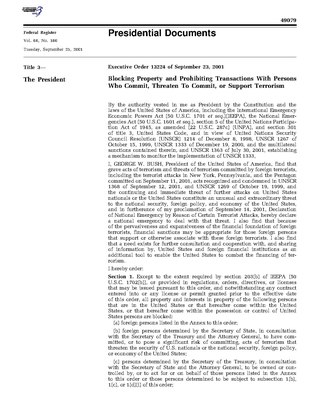
The Office of Foreign Assets Control (OFAC) is a financial intelligence and enforcement agency of the United States Treasury Department. It administers and enforces economic and trade sanctions in support of U.S. national security and foreign policy objectives. Under presidential national emergency powers, OFAC carries out its activities against foreign governments, organizations, and individuals deemed a threat to U.S. national security.

Executive Order 13224 is an executive order issued by U.S. President George W. Bush on September 23, 2001, as a response to the attacks on September 11, 2001. It has been renewed every year since.
Executive Order 12170 was issued by American president Jimmy Carter on November 14, 1979, ten days after the Iran hostage crisis had started. The executive order, empowered under the International Emergency Economic Powers Act, ordered the freezing of all Iranian government assets held within the United States.

United States sanctions are financial and trade restrictions imposed against individuals, entities, and jurisdictions whose actions contradict U.S. foreign policy or national security goals. Financial sanctions are primarily administered by the U.S. Department of the Treasury's Office of Foreign Assets Control (OFAC), while export controls are primarily administered by the U.S. Department of Commerce's Bureau of Industry and Security (BIS).

The International Emergency Economic Powers Act (IEEPA), Title II of Pub. L. 95–223, 91 Stat. 1626, enacted October 28, 1977, is a United States federal law authorizing the president to regulate international commerce after declaring a national emergency in response to any unusual and extraordinary threat to the United States which has its source in whole or substantial part outside the United States. The act was signed by President Jimmy Carter on December 28, 1977.
A Specially Designated Global Terrorist (SDGT) is a person or entity that has been designated as such by the United States Department of State or the U.S. Department of the Treasury. An SDGT designation is made under authority of U.S. Executive Order 13224 of September 23, 2001, as amended by Executive Order 13268 of July 2, 2002, and Executive Order 13284 of January 23, 2003, and Title 31, Parts 595, 596, and 597 of the U.S. Code of Federal Regulations, among other U.S. laws and regulations. The main regulatory framework underlying the SDGT designation was established two weeks after the September 11 attacks in 2001 by U.S. President George W. Bush.
The Htoo Group of Companies is a Burmese holding company, with headquarters at 5 Pyay Road, Hlaing Township, Yangon, Myanmar. HGC is the parent company of Air Bagan, a privately held Burmese airline company. The company has several subsidiaries. Htoo Wood Products Company Ltd. is engaged in logging and export of timber. Htoo Trading Company, is engaged in construction, property development, agriculture, transportation, shipping, mining, hotels and tourism operations. Htoo Trading Company and Asia World Company were the first two construction companies granted contracts to build the new national capital in Naypyidaw. Htoo Trading Company is Burma's top private exporter and fifth largest overall, with gross revenues of $65.1 million.
The Cuban Assets Control Regulations, (CACR) 31 CFR 515, generally regulate relations between Cuba and the U.S. and are the main mechanism of domestic enforcement of the United States embargo against Cuba.

The Foreign Narcotics Kingpin Designation Act, better known as the Kingpin Act, is landmark federal legislation in the United States intended to address international narcotics trafficking by imposing United States sanctions on foreign persons and entities involved in the drug trade.

International sanctions against Afghanistan were implemented by the United Nations in November 1999. The sanctions were initially aimed at terrorists, Osama bin Laden and members of Al-Qaeda. The United States, the United Kingdom and the European Union also impose sanctions on Afghanistan.

Executive Order 13936, entitled "The President’s Executive Order on Hong Kong Normalization", is an executive order signed by U.S. President Donald Trump on July 14, 2020. On the same day Trump had signed into law Hong Kong Autonomy Act, one of the laws from which the order derives authority. The act and the executive order are the U.S. response to the imposition of a controversial national security law in Hong Kong by the Standing Committee of the National People's Congress of China on June 30, 2020, which was described as "an unusual and extraordinary threat [...] to the national security, foreign policy, and economy of the United States" in the preamble.
Executive Order 14059, officially titled Imposing Sanctions on Foreign Persons Involved in the Global Illicit Drug Trade, was signed on December 15, 2021, and is the 75th executive order signed by U.S. President Joe Biden. The telos of the order is to enforce sanctions upon foreigners involved in global illicit drug trade.
Task Force KleptoCapture is a United States Department of Justice unit established in March 2022 with the goal of enforcing sanctions on Russian oligarchs in response to the Russian invasion of Ukraine.

The United States has supported Ukraine during the ongoing Russian invasion of Ukraine. After it began on 24 February 2022, President Joe Biden condemned the invasion, provided military, financial and humanitarian aid to Ukraine, and imposed sanctions against Russia and Belarus.
Executive Order 14071, officially titled Prohibiting New Investment in and Certain Services to the Russian Federation in Response to Continued Russian Federation Aggression, was signed on April 6, 2022, and is the 87th executive order signed by U.S. President Joe Biden. The telos of the order is to restrict investment and certain services into the Russian Federation due to their unrelenting violence against Ukraine.







